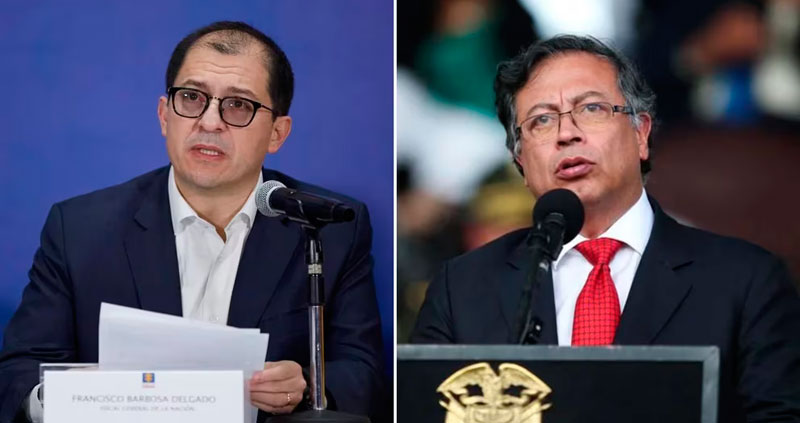From Buenos Aires, Argentina, where a meeting with prosecutors from the Mercosur countries is taking place, prosecutor Francisco Barbosa once again raised a strong controversy with the government of President Gustavo Petro.
Barbosa denied that the General Prosecutor’s Office is carrying out negotiations with drug traffickers, this within the framework of “Total Peace,” as the Minister of the Interior, Luis Fernando Velasco, said. “That is false. Here the only one that has expressed interest in negotiating with drug traffickers is the government. The Prosecutor’s Office and prosecutors exclusively apply the law. The terms of that law will be defined by Congress and not by drug traffickers or government negotiators,” Barbosa said in an interview with Semana Magazine.
The prosecutor also commented that the national government, with its statement, “again disrespects justice.” It is worth mentioning that Luis Fernando Velasco said before the media cited on Wednesday, May 10: “The Government does not negotiate with drug traffickers, who negotiates a demobilization is the Prosecutor’s Office.”
During the conversation, Velasco affirmed that the Total Peace policy has two ways to end the conflict; The first consists of direct political negotiation with groups that recognize political status, using the National Liberation Army and the Revolutionary Armed Forces of Colombia (FARC) as examples.
On the other hand, the official mentioned that it is useless to demobilize the ELN if they maintain “a war machine like the Gulf Cartel.” Once the national government builds a public demobilization policy.
It is necessary to remember that there is a demobilization law that was presented to the Congress of the Republic and for which a paper will be rendered. The Minister of the Interior added: “Here comes the big difference: whoever negotiates a demobilization is basically a prosecutor, whoever the law defines.”
Petro-Barbosa: debate between officials
In recent days, the national community has been aware of the constant fights between the President of the Republic and the Attorney General, so much so that the latter in question filed a complaint. Now it is important to analyze the positions and mentions of each one.
The debate began on April 26 by the president because through his official Twitter account he shared a complaint from the La Nuestra Prensa web portal in which he stated that prosecutor Daniel Hernández had covered up a series of murders perpetrated by the Clan del Gulf. In response to this, prosecutor Francisco Barbosa stated that the publication puts Hernández and his family at risk.
After this on Friday, May 5, the president commented from Spain that as head of state he is also the head of Barbosa, these statements generated a fight in which the prosecutor told the president that “he was not elected dictator.” After this statement, the president reaffirmed what was said from Spain through his Twitter account and shared article 115 of the Constitution: “head of state, head of government and supreme administrative authority.”
With these affirmations on one side and the other, divisions have been generated even within the judicial branch of the nation. The lawyer José Gregorio Hernández spoke with Cambio, since he was part of the Constitutional Court between 1992-2001 and commented in the media, “the separation of powers and the balance between the branches of public power say that, not because he is the head of the State, becomes head of the other organs and branches of public power.
Along the same lines, the lawyer Juan Manuel Charry also spoke with Cambio and stated; “The branches of public power are autonomous and independent, which means that one does not command the other and they function separately and must collaborate harmoniously.”
Hernández also commented that what the scenario would mean is breaking the democratic principle of the balance of those who carry out their functions, in addition, that the president, like any citizen, has the right to ask the prosecutor about investigations that are of national interest.
In this way, the two connoisseurs of the laws agree that the prosecutor does not have a hierarchical superior. However, in the event that he should be investigated, this falls to Congress, which is also the body that could investigate the president. with Infobae
